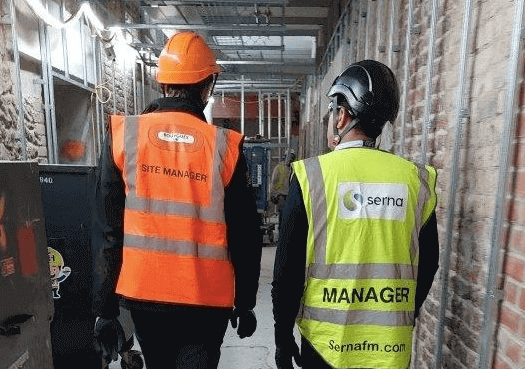Sustainable facilities management (SFM) focuses on managing buildings and infrastructure in an environmentally responsible, economically viable and socially beneficial manner. It involves adopting practices that minimise environmental impact, reduce energy consumption, and promote long term cost savings while ensuring the well-being of building occupants.
This approach is particularly important as businesses and public organisations seek to meet sustainability targets and reduce their carbon footprint in a rapidly changing world.
How Does Sustainable Facilities Management Reduce Energy Consumption?
A key component of sustainable facilities management is reducing energy use and greenhouse gas emissions. This involves implementing energy-efficient technologies, such as LED lighting, smart HVAC systems, and renewable energy sources like solar panels.
According to the Carbon Trust, businesses in the UK can cut their energy bills by as much as 20% through better energy management practices. By tracking energy usage and optimising building operations, facility managers can help reduce emissions and lower energy costs, contributing to both environmental and financial goals.
SFM also promotes the use of renewable energy where possible. Facilities can install solar panels or tap into wind energy to power their operations. By reducing reliance on fossil fuels, these methods help decrease carbon footprints and contribute to national sustainability goals, such as the UK’s target to reach net-zero emissions by 2050.

Are Sustainable Materials Used?
Another pillar of sustainable facilities management is the use of environmentally friendly materials and waste reduction. Facility managers are encouraged to source materials that have a low environmental impact, such as recycled products or sustainably sourced wood. When buildings are renovated or constructed, sustainable facilities management ensures that materials are chosen for their low environmental impact and durability.
Waste management is a crucial aspect of SFM. According to WRAP (Waste and Resources Action Programme), businesses in the UK generate 41.1 million tonnes of commercial waste annually, and better waste management practices can reduce this significantly.
Sustainable practices include recycling initiatives, waste minimisation strategies, and reducing single-use plastics within the facility. Effective waste management not only reduces environmental harm but can also lower operational costs.
Does Facilities Management Involve Water Efficiency?
Sustainable facilities management also involves improving water efficiency. Buildings consume vast amounts of water, especially in areas like restrooms, kitchens, and landscaping.
Sustainable management practices may include installing low-flow toilets, taps and showers, implementing water recycling systems, and monitoring water usage to detect leaks and inefficiencies.
This is particularly relevant in water-stressed areas. In the UK, where water scarcity is becoming a concern in some regions, effective water management is an essential part of reducing the environmental impact of facilities.
Does Facilities Management Focus On The Health and Wellbeing of Occupants?
Sustainable facilities management goes beyond just the environment—it also focuses on the health and wellbeing of building occupants. Indoor environmental quality, including air quality, lighting, and temperature control, directly affects the comfort and productivity of workers. By ensuring optimal conditions for occupants, facility managers can enhance workplace well-being and contribute to overall business success.
Incorporating sustainable practices also boosts employee morale and attracts eco-conscious talent. According to a 2022 UK Green Building Council survey, over 60% of employees prefer working for companies that prioritise sustainability, highlighting the link between sustainable management and workplace satisfaction.
What Are The Economic Benefits of Sustainable Facilities Management?
In addition to its environmental and social benefits, sustainable facilities management is also financially advantageous. By reducing energy, water and waste disposal costs, businesses can lower their operational expenses.
Sustainable practices can also improve the longevity of facilities by reducing wear and tear, leading to lower maintenance costs in the long term. Facilities that adopt sustainability measures may also be eligible for government incentives, such as tax relief for energy-efficient equipment and grants for renewable energy projects. These financial incentives further support the shift towards sustainable facilities management.
What Is The Future of Sustainable Facilities Management?
As sustainability becomes a priority for governments, businesses and individuals alike, sustainable facilities management will continue to evolve. Facility managers must stay ahead of trends and regulations, integrating the latest technologies and practices to maintain eco-friendly operations.
In the future, sustainable facilities will likely incorporate more advanced technologies, such as smart building systems that automatically adjust energy use and artificial intelligence to monitor and optimise operations. With ongoing advancements, SFM will remain at the forefront of the global push toward more sustainable, resilient, and cost-effective infrastructure.

The Bottom Line
Sustainable facilities management plays a crucial role in reducing the environmental impact of buildings while providing economic benefits and improving the wellbeing of occupants. By embracing energy efficiency, water conservation, waste reduction, and the use of sustainable materials, facility managers can contribute to a more sustainable future.
As the demand for sustainable business practices grows, facilities management will continue to be key in helping organisations meet their sustainability targets, enhance their reputation, and cut costs.

